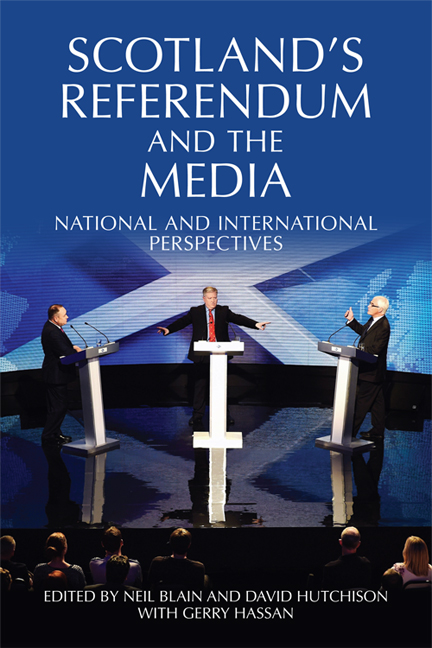Book contents
- Frontmatter
- Contents
- Preface
- Part One The Referendum in Scotland
- Part Two Views from the UK
- 9 English Television News Coverage of the Scottish Referendum
- 10 The English Press and the Referendum
- 11 Wales, Devolution and the Scottish Independence Debate
- 12 Our Friends Across the Water: Northern Ireland Media Coverage of the Scottish Independence Referendum
- Part Three International Perspectives
- Notes on the Contributors
- Index
9 - English Television News Coverage of the Scottish Referendum
from Part Two - Views from the UK
Published online by Cambridge University Press: 05 August 2016
- Frontmatter
- Contents
- Preface
- Part One The Referendum in Scotland
- Part Two Views from the UK
- 9 English Television News Coverage of the Scottish Referendum
- 10 The English Press and the Referendum
- 11 Wales, Devolution and the Scottish Independence Debate
- 12 Our Friends Across the Water: Northern Ireland Media Coverage of the Scottish Independence Referendum
- Part Three International Perspectives
- Notes on the Contributors
- Index
Summary
Introduction
On Sunday, 14 September 2014, reporting of the Scottish referendum campaign on ITN's Channel 4 News included footage of a demonstration outside the BBC's television studios in Glasgow. The demonstrators’ main accusation was that the BBC was ‘biased’ against the Yes campaign and the footage included prominent display of a placard calling for the BBC's political editor, Nick Robinson, to be sacked. Understandably perhaps, the BBC's own reporting of the demonstration was less extensive, with no identification of Robinson, and only a passing reference to ‘perceived bias at the BBC’. However, it was discussed extensively with Blair Jenkins, chief executive of the Yes campaign, on the following day's edition of The Daily Politics. Here Jenkins was at pains to assert that the demonstration had not been organised by the campaign, but rather was a spontaneous event, crowdsourced through social media. Although he was subject to critical interrogation by his interviewer, Jo Coburn, Jenkins continued to claim that there was an ‘inability of London based journalists’ to understand what was happening in Scotland, and that Scottish journalists were being ‘elbowed aside’ by their English counterparts.
Clearly this perception sets an agenda for a survey of English television news coverage of the referendum. Was the BBC in fact guilty of bias, as charged? To investigate this accusation, I have analysed nearly fifty hours of TV news coverage, including every BBC 10 o'clock news from 3 September to 20 September, as well as the subsequent programme, Newsnight, over the same period. I have also looked at twelve editions of the BBC's The Daily Politics and three editions of its Sunday morning equivalent, The Andrew Marr Show. For comparison I also recorded and studied ITN's Channel 4 news, which was selected in preference to other ITN news bulletins on the assumption that, with its greater length (fifty-five minutes), it would contain more in-depth and detailed coverage of this type of political event.
But before we can embark on this analysis, there is a problematic issue that must be addressed. This is because the title of this chapter, and indeed the brief I was given by the editors of this volume, begs an important question; namely, that there is something that can be defined as ‘English’ television news.
- Type
- Chapter
- Information
- Scotland's Referendum and the MediaNational and International Perspectives, pp. 97 - 108Publisher: Edinburgh University PressPrint publication year: 2016



